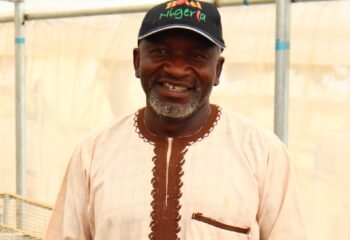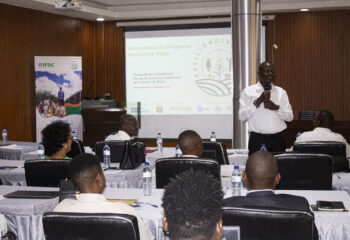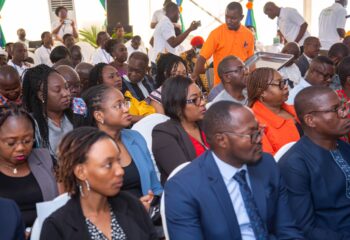Press Release
For Immediate Release
Tuesday, April 11, 2017
April 11, 2017 – Lomé, Togo – The West Africa Fertilizer Program (USAID WAFP), the Four-Country Cotton Partnership (USAID C4CP) and the Feed the Future Ghana Agricultural Technology Transfer Project, all implemented by the International Fertilizer Development Center (IFDC), in collaboration with the Economic Community of West African States (ECOWAS) and with funding from the United States Agency for International Development (USAID) and Feed the Future, the U.S Government’s Global Hunger and Food Security Initiative, are organizing a regional forum on the theme: “From Soil Analysis to Delivering More Profitable Fertilizers to Farmers” from April 11 to 13, 2017 at Hotel Sarakawa in Lomé, Togo.
The objective of this workshop is to agree on pathways to delivering fertilizer recommendations that will result in sustaining greater yields and returns on fertilizer investments, particularly for smallholder farmers. Important steps in this process include:
- Soil analysis and nutrient deficiency mapping on a macro scale to determine the extent and variability of nutrient deficiencies and soil acidity constraints
- Developing and validating soil- and crop-specific fertilizer and lime recommendations
- Developing the means to deliver improved fertilizer products to farmers in collaboration with fertilizer producers, blenders and distributors
- Addressing regulatory issues and policy constraints that may impede introduction of diverse fertilizer products into the market.
According to Dr Ekwe Jean Dosa, Soil Fertility Specialist and Coordinator of the forum, this collaboration among three (3) projects implemented by IFDC offers many advantages: “the theme of this forum is common to all the projects and we will be able to get the best out of the synergy that this collaboration will generate, the richness of ideas to be shared and the interactions between partners”.
This regional forum brings together more than 160 participants from South Africa, Kenya, Uganda, Cameroon, Chad, France, Netherlands, Sweden, USA and the 15 ECOWAS Member-States, representing:
- National, regional and international agricultural research centers
- Regional African-led Organizations (ECOWAS, WAEMU, CILSS, CORAF/WECARD)
- The Fertilizer Industry (Yara Ltd, Toguna, Senchim, WAFA, Notore, OCP)
- International Organizations (IFDC, IITA, AGRA)
- Developing and commercial Banks (AfDB, The Islamic Bank, Agricultural Development Bank)
- Private Laboratories (SGS, Cropnuts, Soilcares)
- Donors ( USAID, DGIS, OCP Foundation)
Many topics will be discussed during the forum, including: Soil testing and mapping, developing and validating fertilizer formulations, scaling up fertilizer recommendations, fertilizer policy and fertilizer regulations.
# # #
IFDC is a public international organization addressing critical issues, such as international food security, the alleviation of global hunger and poverty, environmental protection and the promotion of economic development and self-sufficiency through the use of agricultural technologies including fertilizers and other inputs.
The West Africa Fertilizer Program (USAID WAFP) is a five-year USAID-funded program implemented by IFDC in ECOWAS Member States and, to some extent, in Chad and Mauritania. The program’s strategic objective is to increase regional availability and use of appropriate and affordable fertilizer. Four key elements necessary to meet WAFP’s strategic objective are: (i) private sector investment and regional trade, (ii) knowledge and use of improved fertilizer recommendations, (iii) implementation of regionally consistent regulations, and (iv) improvement of subsidy policies.
The Four-Country Cotton Partnership (USAID C4CP) is a four-year (2014-2018) $14.8 million project funded by the United States Agency for International Development (USAID) and implemented by the International Fertilizer Development Center (IFDC) aimed at improving food security in targeted areas of the C-4 countries (Benin, Burkina Faso, Chad and Mali). The strategic objective of the project is to increase the incomes of male and female producers, as well as cotton processors in targeted areas. USAID C4CP focuses on cotton and rotational crops, mainly cereals and legumes.
The Feed the Future Ghana Agricultural Technology Transfer Project is increasing the availability of appropriate and affordable agriculture-related technologies to sustainably improve the competitiveness of the maize, rice, and soybean value chains in northern Ghana. USAID/Ghana is funding the project for a period of five years through a Cooperative Agreement to the International Fertilizer Development Center (IFDC).
The Feed the Future Ghana Agricultural Technology Transfer Project is improving Ghana’s agricultural research and extension systems by creating a private sector-led agricultural technology transfer mechanism, linking research, extension systems, and producers in a market driven approach to seed variety development and dissemination.
Contacts:
Daniel Nana Sei Mensah, Bilingual Communication Specialist, dmensah@ifdc.org (+228) 93890286/ (+233) 26 97 41128
Dr Jean Ekwe Dossa, Soil Fertility Specialist, edossa@ifdc.org (+228) 91536795



